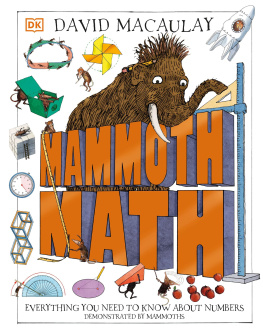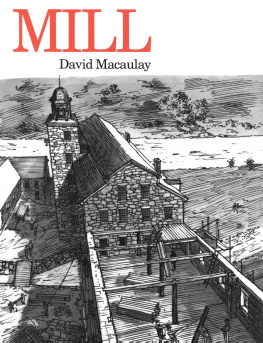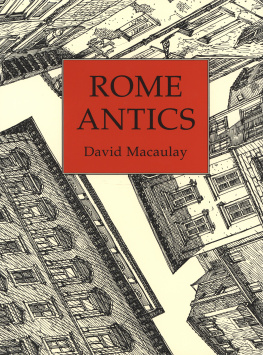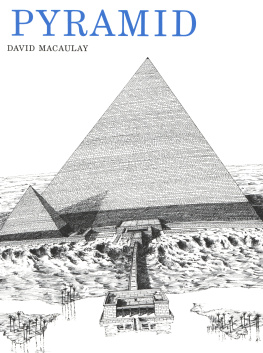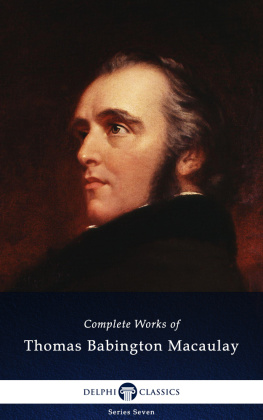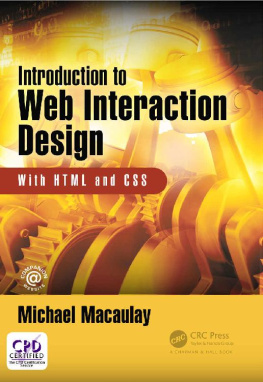Contents
About the Book
Was Thomas Macaulay a cultural imperialist or a prophetic moderniser? He always inspired both admiration and hostility. He introduced English education to India, creating a class of westernised Indians often reviled as Macaulays children, but today many former Untouchables literally worship him as their liberator from caste tyranny.
This new biography gives a vivid insight into one of the towering intellects of Victorian Britain, a brilliant, complex, self-made man, who rose from middle-class origins to the highest circles of the worlds largest empire. We follow his meteoric journey from child prodigy to Whig parliamentary orator, playing a major role in the passing of the Great Reform Act of 1832, then imperial administrator and liberal reformer in India, and later Cabinet minister, revered elder statesman and famed historian back in Britain. We also get a revealing portrait of his personal life as a bachelor romantically attached to his sisters.
Masani reclaims Macaulay as a pioneer of globalisation based on the English language and Western values. A strong advocate of liberal interventionism across the globe, he was the ideological precursor of Margaret Thatcher, Tony Blair and Western military interventions in the worlds trouble-spots. But he was also the architect of the soft power through which the West permeates the rest of the world.
About the Book
Zareer Masani has an Oxford history doctorate and is the author of four previous historical books, including a widely acclaimed biography of the former Indian Prime Minister Indira Gandhi. He spent two decades as a current affairs producer for the BBC and is now a freelance journalist and broadcaster. A Macaulay child himself, he is the son of the late Indian politician Minoo Masani and grandson of the eminent historian Sir Rustom Masani.
List of Illustrations
To my History teachers in Bombay, who were proud to be Macaulays children
MACAULAY
BRITAINS LIBERAL IMPERIALIST

Introduction
Thomas Babington Macaulay, historian and statesman, classical scholar, poet and essayist, was one of the towering intellects of the nineteenth century. As a prominent British parliamentarian, he played a key role in the passing of the Great Reform Act of 1832, which opened up British democracy to the booming new industrial cities and their dynamic middle classes. But his greatest achievements were global. He was the first Western thinker to predict that the future of global modernity, science and capitalism lay with an Anglo-Saxon model of development, based on the English language, liberal political and economic ideas and representative government.
As a politician, Macaulay was the first to formulate a coherent doctrine of British-led, liberal interventionism across the globe and thusfor better or worsethe ideological precursor of Margaret Thatcher, Tony Blair and Western military interventions in Iraq, Afghanistan and most recently Libya. He was an ardent supporter of the controversial First Opium War against China (see globalisation in the British Empire, and by extension across the world.
Its astonishing that there has been no comprehensive biography of Macaulay since the late nineteenth-century volume by his nephew, the historian Sir George Otto Trevelyan. Though largely forgotten in the land of his birth, Macaulay and his legacies are still alive and hotly contested in the Indian subcontinent, where he had the chance to put his ideas into practice. The term Macaulays Children used to be a pejorative label for anglicized Indians, and he is still the bte noire of many Indian nationalists. But today, as India builds on Macaulays legacies in its bid to become an economic super-power, the time is ripe for a more balanced reappraisal of his contribution to Indian nation-building. Its no accident that he is still celebrated as a saviour by many Dalits, who believe that his progressive educational ideas freed them from caste tyranny.
As a bookish intellectual, Macaulay was an unlikely model of an imperial nation-builder; and his four-year stay in India was prompted by no more than a need to boost his sagging private income. He went out in 1834 as adviser to the enlightened Governor-General, Lord William Bentinck, who collaborated with Indian reformers like Raja Ram Mohan Roy to implement dramatic social reforms such as the abolition of sati. It was a crucial watershed in the evolution of the Raj from a trading company into an interventionist colonial power with a civilizing mission.
The earlier generation of British adventurers, who had established the East India Company as the dominant power in the subcontinent, had been far more concerned with trade and plunder than with governance. Many of them had also been more eager to explore exotic Indian cultures than to impose their own. But by the time of Macaulays arrival, British attitudes had become sharply polarised between the so-called Orientalists, who wanted to study and preserve Indian traditions and institutions, and the liberal reformers who wanted to modernise and transform them on Western lines.
Macaulay enthusiastically took up cudgels against the Orientalist faction in British India, which had so far supported the revival of indigenous languages and learning. He led a heated debate about the merits of traditional Indian education and its Western alternatives. And he won the argument with his famous Education Minute, making English language education the basis of a class who may be interpreters between us and the millions whom we govern; a class of persons, Indian in blood and colour, but English in taste, in opinions, in morals and in intellect.
This new imperial vision of assimilation via language was played out in the classrooms of the schools and colleges which now sprang up across British India, most of which are still thriving centres of learning for Indias westernized elite. My own former school, the Cathedral in Bombay, is one of them, its ethos summed up by the school anthem, sung to the tune of the Harrow Boating Song, with the opening lines: Prima in Indis, gateway of India, door of the East with its face to the West.
Macaulay was notoriously dismissive, if not downright hostile and contemptuous, towards native Indian, and particularly Hindu, customs and religious superstitions. Despite being a formidable linguist, he made no attempt to master any Indian languages, and his knowledge of Sanskrit and Arabic texts was confined to a few European translations and summaries. Though confident of the superiority of Western scientific knowledge, he believed passionately that, once Indians acquired it, they could and should become the political equals of their colonial masters.
Macaulay also argued, and history has proved him right, that English as the language of modernity would complement and revitalize native languages, rather than replace them. In the immediate post-Independence period, there were strenuous efforts by Central and State governments to replace English with Hindi, the official national language, and also the various regional vernaculars. Linguistic nationalism became a major political force; there were language riots, and state boundaries were redrawn on linguistic lines. And yet, sixty years on, the pendulum has swung decisively back in favour of English as the language of global success, with even the most chauvinistic Indian politicians sending their own children to English-medium schools.
Macaulay spent the last two decades of his life back in Britain as its leading historian, a talented poet (every schoolboy learnt his
Next page

